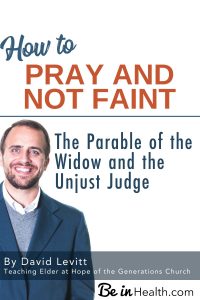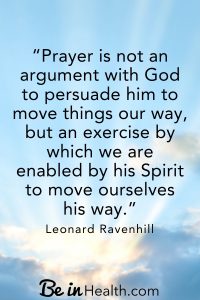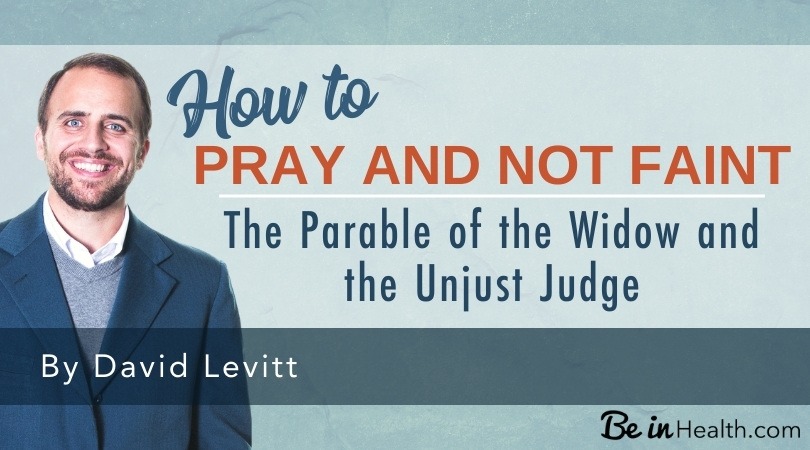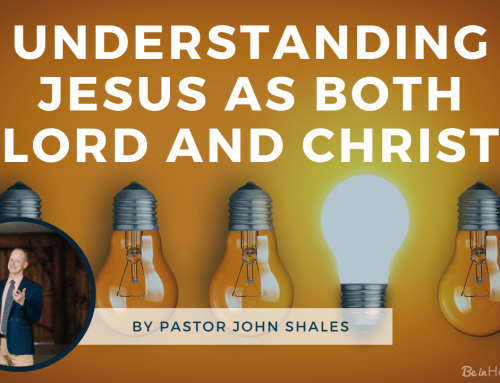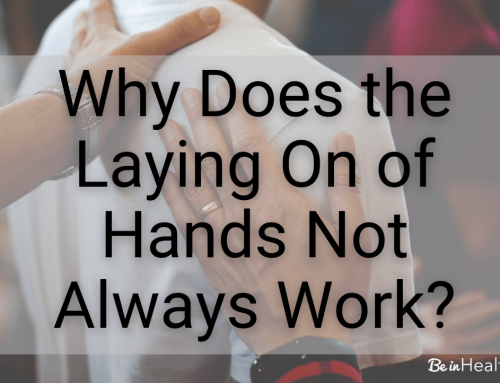How to Pray and Not Faint – The Parable of the Widow and the Unjust Judge
If we step back and think about it, prayer is perhaps the most amazing activity we do as humans. Think about it, through Christ, by just saying, “Our Father,” or even just, “God,” we enter into direct contact and communication with our creator. Every once in a while, when I pray, I have this thought and this awareness that comes over me that I am talking directly to God our Father. It’s surreal that little David Levitt can do that. It’s simple but more awesome than anything else we could ever do as humans. I do not want to just focus on how awesome prayer is, but rather, the absolute vital importance it is to our lives, relationships, and our journey. To do this, I want to look at the parable Jesus taught on the widow and the unjust judge found in Luke chapter 18.
Look at the parable of the widow and the unjust judge.
1 And he spake a parable unto them [to this end], that men ought always to pray, and not to faint; 2 Saying, There was in a city a judge, which feared not God, neither regarded man: 3 And there was a widow in that city; and she came unto him, saying, Avenge me of mine adversary. 4 And he would not for a while: but afterward he said within himself, Though I fear not God, nor regard man; 5 Yet because this widow troubleth me, I will avenge her, lest by her continual coming she weary me. 6 And the Lord said, Hear what the unjust judge saith. 7 And shall not God avenge his own elect, which cry day and night unto him, though he bear long with them? 8 I tell you that he will avenge them speedily. Nevertheless when the Son of man cometh, shall he find faith on the earth? Luke 18:1-8 KJV
Let’s begin in verse one:
And he spake a parable unto them [to this end], that men ought always to pray, and not to faint. Luke 18:1 KJV
I want to focus on the word ‘ought’ in this verse. Ought is the Greek word 1163 in the Strong’s Concordance. In our modern English language, the word ‘ought’ is more of a suggestive word. For example, sometimes my wife and I will be in another town and see a restaurant that looks really good and would make a really great date. We will look at each other and say, “We ought to eat there sometime,” but we never do. When we say, we ought to do something, it never really gets further than just the idea of what we ought to do.
But in the Greek language, the word ‘ought’ is not suggestive at all; in fact, it is a very forceful word. It means: Absolutely necessary, a must, and implies that any other options of what to do should be excluded. Basically, what you ought to do is always the right thing to do, and the right way to do it.
This is necessary for ongoing instruction
The word ought is a present tense verb. This means it is not relegated to a specific action in the past or the future. It is necessary for the ongoing instruction for the disciples then, us now, and the generations to come, until Jesus returns.
What Jesus was saying is that it is absolutely necessary to pray; it’s a must; it’s always a good decision. It is always necessary for you and me to pray if we are sons and daughters of God and disciples of Jesus Christ. Prayer is simply not optional for us, and I hope that I can gracefully persuade you of the same if you are not already convinced.
What is in opposition to praying?
As we continue on in this verse, we come to an antithesis – that is an action that is in opposition to praying. The antithesis or the action that is contrary to praying is to faint.
To faint means to be weary and exhausted, but I think the way I like to describe fainting most, from a Biblical perspective, is to lose heart or give up in our pursuit of something we are desiring. To be clear, I do not see fainting as merely the result of troublesome circumstances of life, but rather the choice we make in losing heart. We are not continuing to pray and walking in faith in the midst of trying circumstances.
We can find ourselves fainting in numerous areas of life. We could be losing heart regarding our marriages, parent/child relationships, work, finances, our relationship with God, conflicts at church, and the list could go on.
Where are you at?
Before we move on, I think it would be wise to take a moment and examine your heart concerning different areas of your life. Which category, prayer or fainting, do you find yourself in as a way of life? This question is in no way meant to condemn anyone but to recognize where you are at so that proper adjustments can be made if need be.
Back to this forceful word ‘ought.’ In this scripture, the word ‘ought’ applies to both prayer and fainting. Verse 1 translated for application could read something like this: Jesus spoke this parable unto them to help them see that prayer is always an absolute necessity, and it is always the right action to take. It is never necessary or right to be weary and lose heart.
We pray for what we still hope for
You see, the things you are praying for are the things you still have hope and faith for. But when we have stopped praying, what we have really done is lost heart that our prayers would ever be heard or answered.
I think we have verse one hammered down, emphasizing the urgent importance that Jesus is placing on choosing to pray rather than lose heart. Let’s move on through the rest of the parable.
… There was in a city a judge, which feared not God, neither regarded man: 3 And there was a widow in that city; and she came unto him, saying, Avenge me of mine adversary. 4 And he would not for a while: but afterward he said within himself, Though I fear not God, nor regard man; 5 Yet because this widow troubleth me, I will avenge her, lest by her continual coming she weary me. 6 And the Lord said, Hear what the unjust judge saith. Luke 18:3-6 KJV
Three key observations
I don’t want to spend a lot of time on this section of the scripture, but I do want to draw out three observations that may help us understand how this parable applies to us.
First off, notice that the widow did not demand the judge to avenge her of her adversary, but she asked. That is a significant distinction. When we demand something from someone, it means that we place ourselves in a higher position than the one we are placing the demand on.
When we ask for something from someone, typically, it is because we cannot do it for ourselves and need someone with the capacity we don’t possess to grant us what we are asking. She recognized that only the judge was able to avenge her; she could not avenge herself, so she placed herself under his authority.
Secondly, the unjust judge was sovereign. Not sovereign over all the universe like God is, but in that he could not be influenced by man or God. His decisions were based totally on what he thought was right, not God or man.
Thirdly, notice that as she was continuing to ask, it was troubling him, or we could say it like this: He was getting annoyed with her.
Just keep these three observations in your back pocket so we can revisit them as we move through the next two verses.
Interpreting a tough passage
Moving on to verse 7, it says:
And shall not God avenge his own elect, which cry day and night unto him, though he bear long with them? Luke 18:7 KJV
Now the interpretation of this was challenging from language alone both from an English and a Greek perspective.
As I see it, there are two possible interpretations of this verse, but only one of them would represent the object of what Jesus was trying to communicate through this parable.
Which one is it?
The first interpretation from the language could go something like this:
And shall God not avenge his own elect, which cry day and night unto him? As though He would delay avenging them?
This makes sense because the next verse says He will avenge them speedily. And after all, He is a good Father, why make His children wait?
But in the language it also works to say:
And shall not God avenge his own elect, which cry day and night unto Him, and He is longsuffering with them in their cries?
This interpretation is saying that God hears them, but is not doing something immediately about it, rather He is waiting with them in their cries.
A rule for Biblical interpretation:
The Bible interprets itself
The Kingdom of God functions in a certain way. That does not put God in a box, but there are other scriptures recorded that would give insight into how the Kingdom of God functions. These scriptures can help us interpret other scriptures, such as verse 7 in Luke 18.
To me, context and harmony of scriptures almost always speak louder than isolated word studies. Meaning if I see the same concept in two or three places, it will help me understand other scriptures that may not be as obvious.
Looking for context
The first place we can look for context is right in the parable. In verses 3-5 the parable specifies that this widow was coming continuously and he was not doing anything about it for a while. That gives us some understanding of God’s timing and how it could relate to verse 7.
Another historical reference that helps us to understand how God works is in Exodus 2 & 3:
And it came to pass in process of time, that the king of Egypt died: and the children of Israel sighed by reason of the bondage, and they cried, and their cry came up unto God by reason of the bondage. 24 And God heard their groaning, and God remembered his covenant with Abraham, with Isaac, and with Jacob. 25 And God looked upon the children of Israel, and God had respect unto [them]. Exodus 2:23-25 KJV
And the LORD said, I have surely seen the affliction of my people which [are] in Egypt, and have heard their cry by reason of their taskmasters; for I know their sorrows; 8 And I am come down to deliver them out of the hand of the Egyptians, and to bring them up out of that land unto a good land and a large, unto a land flowing with milk and honey; unto the place of the Canaanites, and the Hittites, and the Amorites, and the Perizzites, and the Hivites, and the Jebusites. 9 Now therefore, behold, the cry of the children of Israel is come unto me: and I have also seen the oppression wherewith the Egyptians oppress them. Exodus 3:7-9 KJV
Their cries and sighs were over a process of time. In God’s timing, He raised up a deliverer, Moses, whom he addressed in the burning bush in Exodus 3. Then it was another 40 years in the wilderness before Israel crossed the Jordan into the Promised Land.
That is not immediate, is it?
Also, their cries were based on a promise to Abraham, Isaac, and Jacob. In the closing words of the book of Genesis, Joseph said:
And Joseph said unto his brethren, I die: and God will surely visit you, and bring you out of this land unto the land which he sware to Abraham, to Isaac, and to Jacob. 25 And Joseph took an oath of the children of Israel, saying, God will surely visit you, and ye shall carry up my bones from hence. Genesis 50:24-25 KJV
This is a lesson for us that our cries should be based on the promises of God found in the scriptures.
Looking into the future
We can also look into the future to see a pattern of how God works that will help us understand verse 7 of Luke 18.
Revelation 6:9-11 says:
And when he had opened the fifth seal, I saw under the altar the souls of them that were slain for the word of God, and for the testimony which they held: 10 And they cried with a loud voice, saying, How long, O Lord, holy and true, dost thou not judge and avenge our blood on them that dwell on the earth? 11 And white robes were given unto every one of them; and it was said unto them, that they should rest yet for a little season, until their fellow servants also and their brethren, that should be killed as they [were], should be fulfilled. Revelation 6:9-11 KJV
In this chapter, there is a space of time from when God hears the cries of His people and the avenging that He does on their behalf. Based on these examples of the past and the future, I think the second interpretation I gave is the most accurate:
That he is longsuffering with them in their cries, legitimate cries, in which they are admitting and confessing their inability to change their situations and even themselves. They are crying out for their deliverer and for God’s promises to come to pass.
Remember, God is still sovereign
We must always remember that although God has given us personal responsibility and free will in regards to how we respond to situations and circumstances, He is still sovereign. His timing is always right, even if we are in the middle of challenging times.
Leonard Ravenhill said:
“Prayer is not an argument with God to persuade him to move things our way, but an exercise by which we are enabled by his Spirit to move ourselves his way.”
Let’s keep moving ahead into verse 8, and then I will really begin to discuss the application of the parable.
I tell you that he will avenge them speedily. Nevertheless when the Son of man cometh, shall he find faith on the earth? Luke 18:8 KJV
What does speedily mean to God?
What do we make of the word “speedily”? Does that mean instantaneous? No. The word speedily simply means a brief space of time. I see that this means right on time, His perfect timing.
“Speedily” is S5034 in Greek, and it is the same Greek word used in Revelation 22:6.
And he said unto me, These sayings [are] faithful and true: and the Lord God of the holy prophets sent his angel to shew unto his servants the things which must shortly be done. 7 Behold, I come quickly: blessed [is] he that keepeth the sayings of the prophecy of this book. Revelation 22:6-7 KJV
The word “shortly” in verse 6 is Greek word S5034. Now, remember that Revelation was given to the apostle John around 96AD on the island of Patmos. He was told the events contained in the book of Revelation would occur shortly. Well, here we are 2000 or so years later, and it has not fully happened yet.
The word “quickly” in verse 7 is S5035, which is a variant of S5034. Has Jesus come back yet? No, but he said he was coming quickly.
The focus of God’s heart
My point is that these Greek words do not necessarily mean it will happen immediately, but they will surely happen. It is the focus of God’s heart to see to it that they do happen.
If my wife was having a baby (She has had 5), I would drive to the hospital in what way? I would drive speedily!!! Does that mean I arrive immediately? No.
The scripture here that indicates God will avenge His elect speedily simply means that He will avenge them right on time. It will in no way be too late. God is sovereign, His timing is right, He answers when He sees fit, maybe not when we see fit.
The sooner we understand this, the better
I love teaching and writing because in the prepping and meditating on how to unpack truth for others, I learn and grow. There is something in my own life that I have been praying about for a long time. The answer has really seemed to tarry. While studying this parable, I have come to realize that I want God to fix this thing I am praying about immediately. But recently, when praying about this issue, I uttered something amazing.
I said, “God, I will give you time.”
Such peace came over me. Now examine your prayer life. Do your prayers reflect that type of position before God? Or do we need them answered NOW! We must choose to line ourselves up with His timetable. Anyone can do it; all of us OUGHT to do it.
Learn wisdom from the widow
Yes, the widow indeed kept coming, but we can’t lose sight of the fact that she was totally submitted to the unjust judge. This shows her wisdom because she recognized that only he had the power to avenge her, and it would be on his timetable. Although she was persistent in her request, she was submitted to how the judge would work it out.
Likewise, if you don’t get on God’s timetable, you will faint. You will be trusting in your own perspective, your own thoughts, and your own ways.
One thing I like most about prayer
Do you know one of the things I like most about prayer? It makes God big and me small in my life. That takes the pressure off of me. It’s an antidote to fainting.
Continuing in verse 8, let’s look at the word ’nevertheless.’ ‘Nevertheless’ means, in spite of – In spite of God’s faithfulness to avenge and answer His elect. In spite of all the testimonies and records of His faithfulness to man. In spite of 6,000 years of history proving there is a faithful Living God that will answer and save His elect that cries unto Him.
By saying, ‘nevertheless,’ Jesus is questioning whether he will find people still trusting, praying, and enduring till the end, or will he find a people that lost hope and heart that His promises would come to pass?
A lesson from the Israelites
This principle was perhaps the Israelites biggest failure. God even said this was a people in whom was no faith, and they fainted in the wilderness.
Of the Rock [that] begat thee thou art unmindful, and hast forgotten God that formed thee. 19 And when the LORD saw [it], he abhorred [them], because of the provoking of his sons, and of his daughters. 20 And he said, I will hide my face from them, I will see what their end [shall be]: for they [are] a very froward generation, children in whom [is] no faith. Deuteronomy 32:18-20 KJV
They didn’t finish what they started in Exodus 2 & 3. They started their freedom in their prayers and their cries and their faith in God to take them out of Egypt and into the Promised Land. But they fainted along the way.
What will Jesus find?
Will Jesus find a praying people waiting for Him? Will He find faith on the earth? Faith in the Father’s perfect timing to send Jesus Christ back to this earth to avenge His elect.
We must choose to submit to this because even Jesus is submitted to this principle. Think about it, Jesus does not know when He is coming back, but He has not given up on it happening. He is not fainting before God the Father because He has not been sent back yet to rule and reign on the earth. Neither should we.
Why we should be serious about prayer
I want to be serious about prayer because, from my take, it is the only way we will endure till the end and not lose our first love. Let me explain; 2 Peter 3:9-15 says:
The Lord is not slack concerning his promise, as some men count slackness; but is longsuffering to us-ward, not willing that any should perish, but that all should come to repentance. 10 But the day of the Lord will come as a thief in the night; in the which the heavens shall pass away with a great noise, and the elements shall melt with fervent heat, the earth also and the works that are therein shall be burned up.
11 [Seeing] then [that] all these things shall be dissolved, what manner [of persons] ought ye to be in [all] holy conversation and godliness, 12 Looking for and hasting unto the coming of the day of God, wherein the heavens being on fire shall be dissolved, and the elements shall melt with fervent heat?
13 Nevertheless we, according to his promise, look for new heavens and a new earth, wherein dwelleth righteousness. 14 Wherefore, beloved, seeing that ye look for such things, be diligent that ye may be found of him in peace, without spot, and blameless. 15 And account [that] the longsuffering of our Lord [is] salvation; even as our beloved brother Paul also according to the wisdom given unto him hath written unto you; 2 Peter 3:9-15 KJV
I want to draw your attention to verse 14. Fulfilling verse 14 is only possible with prayer.
Some questions to explore
How does prayer keep you moving into what verse 14 says we are to be doing? How does prayer enable us to look for such things, to be found in peace, blameless, and without spot? What does prayer regarding God’s will, your desires, and needs accomplish in you besides your prayers being answered?
Let’s look at Luke 21:34-36:
And take heed to yourselves, lest at any time your hearts be overcharged with surfeiting, and drunkenness, and cares of this life, and [so] that day come upon you unawares. 35 For as a snare shall it come on all them that dwell on the face of the whole earth. 36 Watch ye therefore, and pray always, that ye may be accounted worthy to escape all these things that shall come to pass, and to stand before the Son of man. Luke 21:34-36 KJV
The context here is Jesus describing the days that precede the coming of the Son of Man. According to this scripture, prayer makes us watchful and aware. It keeps our mind stayed on Him and protects us from the distractions of the world that would steer us off course.
One of the greatest benefits of prayer
However, perhaps the greatest benefit I see that comes with prayer is found the night before our Lord and Savior, Jesus Christ, was crucified.
Matt 26:36-41 says:
Then cometh Jesus with them unto a place called Gethsemane, and saith unto the disciples, Sit ye here, while I go and pray yonder. 37 And he took with him Peter and the two sons of Zebedee, and began to be sorrowful and very heavy. 38 Then saith he unto them, My soul is exceeding sorrowful, even unto death: tarry ye here, and watch with me. 39 And he went a little further, and fell on his face, and prayed, saying, O my Father, if it be possible, let this cup pass from me: nevertheless not as I will, but as thou [wilt]. 40 And he cometh unto the disciples, and findeth them asleep, and saith unto Peter, What, could ye not watch with me one hour? 41 Watch and pray, that ye enter not into temptation: the spirit indeed [is] willing, but the flesh [is] weak. Matthew 26:36-41 KJV
I submit to you that Jesus did not say this to avoid temptation, but rather to not yield (enter into) to the temptation that was facing them in that moment and in the times to come.
Jesus himself was under temptation at this point to not do the Father’s will. He was sorrowful, heavy, and tempted to avoid the cross. It was prayer that sustained Him in the day of temptation.
What time is it?
There is a time to quote the Word at the enemy in temptation, as Jesus did when Satan tempted Him in Matthew chapter 4. There is also a time to pray during temptation.
A willing spirit is great, but that alone is not sufficient to make us overcomers. The flesh is weak, and our will is not enough. We need the strength, power, and leadership of The Holy Spirit that comes to those that humble themselves in prayer. It means we admit we are praying because we can’t make anything happen that needs to happen.
Not a substitute for prayer
Discernment and knowledge are absolute necessities for victory, but they are NOT a substitute for prayer. Discernment and knowledge aid us in knowing how to pray, but if you try to overcome with just discernment and knowledge, you will be in your own strength. That is a snare to be avoided.
When the cares of life and things in the journey get overwhelming, I don’t go looking for a tool to fix it. I have learned and am learning to pray, and my Father will begin to lead me to which tool to pick up to fix it. Remember, the goal of the Word is not for you to get enough knowledge that you don’t need God anymore.
What does correct prayer look like?
Correct prayer positions you in a humble, dependent position before God, our Father. Through casual observation, we can see that around 95% of the prayers in the Bible involve asking God for something. That means He can do something for you and for this earth that you can’t do.
If you are asking someone for something, it is because you cannot do it for yourself in that moment or circumstance. So we are admitting God is greater because we are asking for something we ourselves cannot do in the natural. Prayer is where you take the position of weakness and are left with no other options but to trust Him.
This is what Jesus is talking about when He says, “When I come back, will I find faith on the earth?” Will I find my bride faithfully waiting on me, preparing herself, and waiting with anticipation?
Or will she have fainted and lost heart while waiting?
Or worse, will she have married someone else?
Prayer is a refuge
People say prayer is so much work, or the battle just gets too intense. I have had my seasons in that type of thinking, and certainly, those temptations come. But prayer is a refuge; it’s a place of comfort and rest. It’s where I know that I am small and God is big and that I am finite and limited in my capabilities. I have no choice but to accept that because I know that to think I can do it on my own would be a deception that would cause me to faint.
Prayer is a place where we are formed, stretched, challenged, and get victories.
Again Leonard Ravenhill, a great revivalist of the 1900s said:
“No man is greater than his prayer life. The pastor who is not praying is playing; the people who are not praying are straying. We have many organizers, but few agonizers; many players and payers, few pray-ers; many singers, few clingers; lots of pastors, few wrestlers; many fears, few tears; much fashion, little passion; many interferers, few intercessors; many writers, but few fighters. Failing here, we fail everywhere.”
Don’t lose heart
Do not lose heart in those things you are praying for, even if it seems like you are praying against the current. The truth is, you are praying against the current. Continue to pray for God’s will to be done on earth, oppressive governments to be overthrown, miracles to happen in your family, your calling, and your needs. We are called to this as sons and daughters of God.
Again, my purpose in writing this is so God’s people know why it is an absolute necessity to pray and what it is accomplishing that you may not see with the naked eye in the world, in God’s kingdom, and inside of you.
I love the Word of God because it doesn’t give us many options. Simply put, it says we must pray if we are to overcome and be found having faith on the earth when Jesus returns.
I love the Word because it is food for my spirit.
But prayer is the heartbeat of my spirit.
Be blessed,
David Levitt
Would you like to watch this teaching? David Levitt taught it in a Hope of the Generations Church service:
Do you want to read some related articles?
Here are some resources that may be helpful to you:
- Prayer That Makes a Difference CD Teaching by Dr. Henry W. Wright
- Why Does Laying on of Hands Not Work Like it Should? CD Teaching by Dr. Henry W. Wright
Do you want to save this for later? Pin it now!
